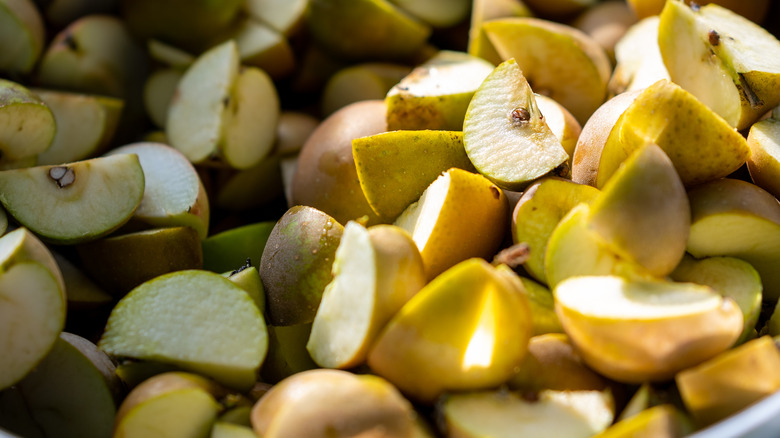The Best Type Of Apples To Use When Making Pectin For Canning
If you've ever made jam, jelly, or marmalade at home, then you've likely called upon the magical substance known as pectin. Familiar to any home canner, pectin is a polysaccharide starch that occurs naturally within the cell walls of fruits and vegetables, according to MasterClass. A gelling agent that helps these condiments set when it's cooked with the sugar and acid also included in the recipes, pectin helps produce the smooth, jiggly texture we associate with these products.
While many jam and jelly recipes call for pectin, which is available in both liquid and powdered forms, not all of them need it, because some fruits and vegetables are naturally high in pectin. Cranberries, citrus fruits, and the tart fruit quince are all high in pectin, Exploratorium writes, as are apples. That last fruit in particular is extremely high in pectin and is often used by home canners to make their own pectin instead of buying it, according to The Spruce Eats. If you're keen to try your hand at making pectin at home, it's easy, requiring only apples, water, and some cheesecloth. However, you're going to want to make sure you have the right type of apples on hand.
Use barely ripe, organic apples for the best results
Want to set your homemade jams and marmalades using your own pectin? It's easy to make at home, according to The Spruce Eats, but you're going to want to select green, under-ripe apples — that are also organic — to get the best results. Let's start with the ripeness. As explained by the Auguste Escoffier School of Culinary Arts, pectin is most present in less ripe fruits, its levels decreasing as the fruit ripens. Therefore, when making pectin, look for green, very firm apples, which indicate less ripe fruit.
You'll also want to choose organic apples, counsels The Spruce Eats. Because a lot of pectin resides in apples' peels and cores, you can actually save these up in your freezer and use them for pectin-making once you have a big batch. But because conventional apples are sprayed with pesticides, most of which stay on the fruit's skin, you'll want to spend the extra money on organic fruit.
Got your green, organic apples? After that, it's smooth sailing — all you have to do is place cubed apples and scraps in a big pot, add enough water to almost cover them, and simmer the mixture until it's mush, up to two hours. Then, set the mixture over a colander lined with cheesecloth, allowing it to drain in the fridge overnight. The jellied liquid that you'll collect is pectin, ready to go for all your jamming needs.

